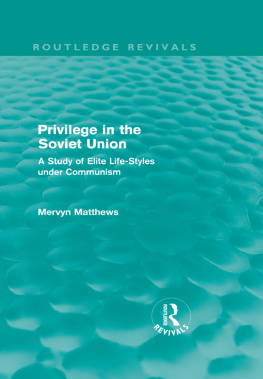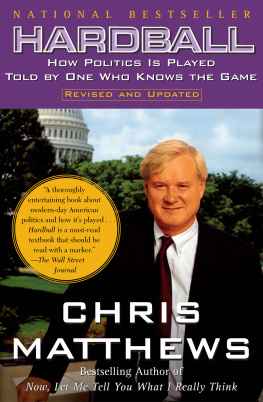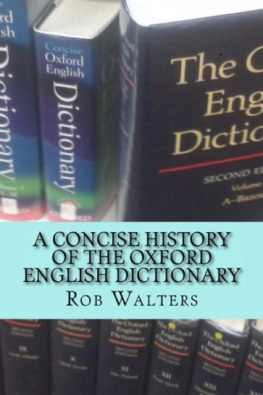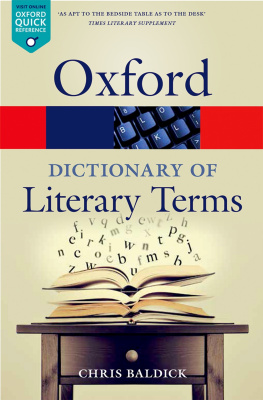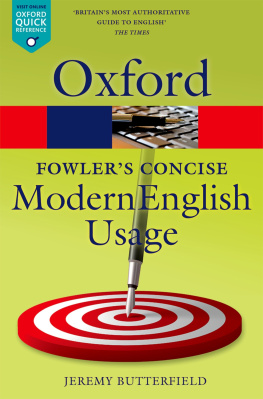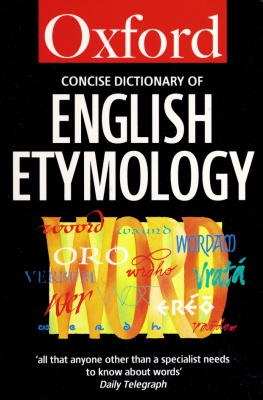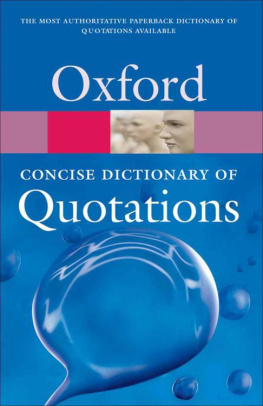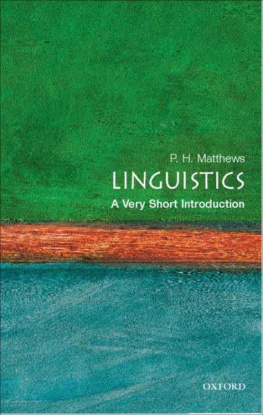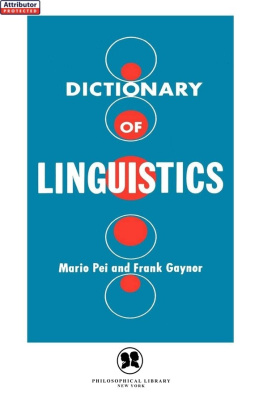Matthews - Concise Oxford Dictionary of Linguistics
Here you can read online Matthews - Concise Oxford Dictionary of Linguistics full text of the book (entire story) in english for free. Download pdf and epub, get meaning, cover and reviews about this ebook. year: 2007, publisher: Oxford University Press, genre: Home and family. Description of the work, (preface) as well as reviews are available. Best literature library LitArk.com created for fans of good reading and offers a wide selection of genres:
Romance novel
Science fiction
Adventure
Detective
Science
History
Home and family
Prose
Art
Politics
Computer
Non-fiction
Religion
Business
Children
Humor
Choose a favorite category and find really read worthwhile books. Enjoy immersion in the world of imagination, feel the emotions of the characters or learn something new for yourself, make an fascinating discovery.

- Book:Concise Oxford Dictionary of Linguistics
- Author:
- Publisher:Oxford University Press
- Genre:
- Year:2007
- Rating:4 / 5
- Favourites:Add to favourites
- Your mark:
- 80
- 1
- 2
- 3
- 4
- 5
Concise Oxford Dictionary of Linguistics: summary, description and annotation
We offer to read an annotation, description, summary or preface (depends on what the author of the book "Concise Oxford Dictionary of Linguistics" wrote himself). If you haven't found the necessary information about the book — write in the comments, we will try to find it.
Concise Oxford Dictionary of Linguistics — read online for free the complete book (whole text) full work
Below is the text of the book, divided by pages. System saving the place of the last page read, allows you to conveniently read the book "Concise Oxford Dictionary of Linguistics" online for free, without having to search again every time where you left off. Put a bookmark, and you can go to the page where you finished reading at any time.
Font size:
Interval:
Bookmark:
A book like this can only be written by one person. If I had had to plan it as an editor, I would have allotted too much space to some entries and too little to others, and individual contributors might in any case have overshot my instructions, even when I was right. But one person cannot be a specialist in the whole of linguistics and, in the fields one thinks one knows, one can make strange mistakes. I am therefore very grateful to all those who have helped me: in particular, at the beginning of the project, to Francis Nolan, Stephen Levinson, and Nigel Vincent, who vetted my original list of headwords, and, at the very end, to Nigel Vincent once more and to Jim McCawley, who read through a complete draft. McCawley especially supplied comments and corrections with a thoroughness and understanding quite beyond the call of duty.
I am grateful to Angus Phillips of the Oxford University Press, for his advice and patience. I have also been fortunate in my copy-editor, Margaret Aherne, who has done extremely well a job that requires many kinds of vigilance simultaneously. My wife, Lucienne Schleich, has commented from a users viewpoint on the wording of many entries, and has helped me very much to develop the right style. She has also had to put up with my tantrums when, at times, the project has been driving me round the bend: without her love and encouragement I would not have finished it.
P.H.M.
December 1996
A 1. = adjective. = agent (2); cf. P, S (3). = argument, as *A-bound, *A-movement.
AAVE = African American Vernacular English.
abbreviated clause = reduced clause.
abbreviationSee acronym; blend; clipping.
abbreviatory convention Any convention that allowed a *generative grammar to be shortened by collapsing two or more rules into one. E.g. a phrase-structure rule A A + Comp (a constituent within an adjective phrase can consist of an adjective plus a complement) can be combined with a rule A A into the single expression A A (Comp). By the relevant convention A (Comp) is understood as either A or A + Comp.
abduction Applied in historical linguistics to the process of reasoning by which, e.g. from All dogs bark and This animal barks, one draws the conclusion This animal is a dog.
Central, in one view, when people develop their native language. E.g. they may learn that if a noun has the ending -s it is plural: so, as one premiss, All noun forms in -s are plural. They may then want to use some noun in the plural. Call the form required f: so, as a second premiss, f is plural. By abduction, the conclusion will be f is a form in -s: therefore, all else being equal, a form in -s is what they will use. In this process of reasoning the conclusion does not necessarily follow: thus the noun in question might have a plural that does not end in -s. But as the result of it the language may change, with -s generalized to nouns that did not previously have it.
Abductive change is change due, it is claimed, to abduction. The term as such was borrowed from *Peirce, but in this sense is specific to linguistics.
abessive *Case indicating that someone or something is absent: e.g. schematically, I came money-ABESS I came without money. From Latin abesse to be away, be absent.
abjad From the first four letters of the Arabic writing system, as alphabet from alpha plus beta. Thence applied to *consonantal alphabets in general.
Abkhaz North West *Caucasian language, spoken between the west end of the Caucasus Mountains and the coast of the Black Sea.
ablative (ABL) *Case whose basic role, or one of whose basic roles, is to indicate movement away from some location: thus Latin cedit Rom (departed Rome-ABL.SG) He left Rome.
ablative absolute *Absolute construction in Latin in which a participle and its subject are in the ablative case and are subordinated, with no other mark of linkage, to the rest of the sentence: e.g. in the sentence urbe capta (the) city-ABL.SG having-been-taken-ABL.SG Caesar recessit Caesar withdrew.
ablaut Morphological variation, in Germanic and other *Indo-European languages, of a root vowel. E.g. in Ancient Greek the root of the verb to leave appeared in three forms: leip- in the present; loip-, in the perfect or in the adjective loips left over; lip-, in the aorist or as the first member of compounds. This illustrates the three original grades of ablaut: the e grade, the o grade, and the zero or reduced grade, with neither e nor o.
Similarly, in English, of vowel variations in *strong verbs (e.g. drive, drove, driven) or between verbs and nouns (sing, song), whether or not they derive directly from the Indo-European system.
A-bound *Bound (2) by a unit in a position which is typically that of a subject, hence more generally by an *argument of, a verb. E.g. in I saw myself, the reflexive myself is A-bound by its antecedent I.
A unit bound by another that is not in an argument- or A-position was defined in *Government and Binding Theory as A-bound. Cf. A-movement.
abrupt *Distinctive feature in the scheme proposed by *Jakobson. Characterized acoustically by a spread of energy over a wide frequency region: thus, in particular, a feature of oral stops as opposed to fricatives. Also called discontinuous or interrupted: opp. continuant.
ABS = absolutive.
absolute 1. (Syntactic element) not accompanied by an element to which one might expect it to be linked. E.g. in This is bigger, bigger is an absolute comparative, not linked, as other comparatives are, to a standard of comparison (bigger than); in His is bigger, his is similarly an absolute possessive, not linked, as possessives in general are, to a noun (his garden, his kitchen,). (Form of word) that has no inflection. Thus an absolute case, e.g. in Turkish, is so called because it is realized by a root alone, with no affix.
An absolute construction is one in which a subordinate element is not linked by a conjunction or in any other specific way to the rest of a sentence. E.g. in We left, the wine having run out, the last five words stand in an absolute relation to we left: cf. We left because the wine had run out (with the conjunction because), or We left, having finished the wine (with a direct relation between having and we).
From Latin absolutus freed from linkage.
absolute adjective One whose sense might be expected to exclude a comparative or superlative. E.g. equal, used as if it were gradable in Some animals are more equal than others.
absolute neutralization Term in *Generative Phonology for the suppression in all contexts of an underlying difference between elements. E.g. in a language with *vowel harmony, a single open vowel might relate sometimes to front vowels and sometimes to back vowels: a distinction might therefore be established between an underlying front a and back , which undergoes absolute neutralization after the rules for harmony have applied.
absolute synonymy
Font size:
Interval:
Bookmark:
Similar books «Concise Oxford Dictionary of Linguistics»
Look at similar books to Concise Oxford Dictionary of Linguistics. We have selected literature similar in name and meaning in the hope of providing readers with more options to find new, interesting, not yet read works.
Discussion, reviews of the book Concise Oxford Dictionary of Linguistics and just readers' own opinions. Leave your comments, write what you think about the work, its meaning or the main characters. Specify what exactly you liked and what you didn't like, and why you think so.

